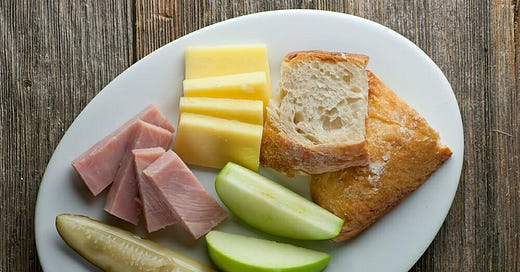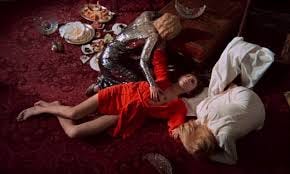A PLOUGHMAN'S LUNCH? HOW'S THAT AGAIN?
EATING WHILE YOU DRINK...AND THINKING WHILE YOU DRINK...
THE PLOUGHMAN’S LUNCH
My wife likes to tell the story of how, on a student visit to England with a girlfriend, they visited that British institution, the pub, and tried to order a staple of pub eating, the Ploughman’s Lunch.
“A what, dear?” asked the baffled barman.
“A ploughman’s lunch.”
“Sorry…. I don’t understand….”
“A Ploughman’s….”
Her friend pointed to the man at the other end of the bar tucking into a plate of cheese, pickles and ham, with a chunk of bread.
“Like that.”
Light dawned. “Oh, you mean a Ploughman’s Lunch. Why didn’t you say so?”
No matter how good your accent, nobody but a born Anglophone will ever pronounce a word like “Ploughman” to the satisfaction of a Brit – any more than a French waiter will understand a British customer asking for rouille. It’s all in the moue, and if you can’t do the moue…
Pubs in England and Wales are disappearing at an alarming rate, according to the BBC this morning, but it’s been like that for decades. The “ploughman’s lunch” might have sounded like the traditional mid-day suspenance of the weary farmer, wrapped in a kerchief and brought to him in the fields by a dutiful daughter, but in fact it was invented by Britain’s Beer Marketing Board in the nineteen-sixties to help stop the move away from pubs. Here was a lunch that could be eaten at the bar, so customers would keep drinking rather than go to a restaurant. Around the same time and for the same reason, French cafes began to serve meals. There’s no money in just selling beverages.
That’s in France and Britain, of course. I wonder if there’s much of a decline in Australian pubs, which are what most Australian males used to have instead of a home life. That was the tradition in which I grew up. After work, one went to the pub. Likewise on weekends - except on Sundays, when the churches ganged up and forced pubs to close - unless, that is, you were a bona fide traveller who needed refreshment after a long journey. Pubs a few yards outside the limit for travellers did a roaring trade.
I grew up in the conviction that drinking, like watching sport, or eating, or going to the cinema, or church, was conducted in premises reserved for that purpose. Then I came to Europe.
In Australia, a night at “the pictures”, like a visit to the pub, was a rite, celebrated in purpose-built Palaces, Plazas and Boomerangs. The cities of France, Germany and Italy still had such places, but once you left the bright lights behind, film-going had as much sense of occasion as a trip to the supermarket.
Invariably dubbed into the local language, a movie might be projected in the town square or on a white wall in the cement-floored yard behind a bar. You sat on stackable chairs, and naturally you took your beer with you. Frequent breaks, usually in mid-scene, permitted toilet visits, and the purchase of more beer.
Cinema here was just another thread in the fabric of daily life; not Cinema as Event but Cinema as Staple. Which did I prefer? Swept along by a Belgian horror movie already incomprehensible before even being dubbed into Italian, I no longer cared. Lush dark female vampires threw off their clothes and sank their fangs into chill Nordic virgins. In Australia, the mere glimpse of a nipple had the censor reaching for his scissors. Here, the locals just nudged one another and took another gulp of Stella Artois.
LUSH FEMALE VAMPIRES. DAUGHTERS OF DARKNESS.
But that kind of cinema has all but disappeared, along with the pub and many other institutions at which people gathered to share an experience. The Saturday and Sunday evening queues outside Paris cinemas are no more. Was there really a time when one reserved a seat for a film?
At the moment, France is gripped by rugby fever. The establishments that used to call themselves “pubs” but now prefer “sports bars” offer the giant screen experience with all the beer you can consume. Most sports fans, however, like their cinéaste compatriots, would just as soon watch at home.
It will be interesting to see if the decision to hold next year’s Olympics in central Paris and on the Seine rather than in purpose-built stadia in the suburbs will revive the enthusiasm for group activity. Given the outcome of recent elections, it seems doubtful. I suspect we have lost the ability to agree on anything; to submerge ourselves as Romans did in the Colosseum and Germans at Nuremberg – and perhaps just as well, given how those worked out. For better or worse, we are becoming a culture of individuals, each of us our little universe. No more Nero, No more Hitler. And no more Ploughman’s Lunch.





